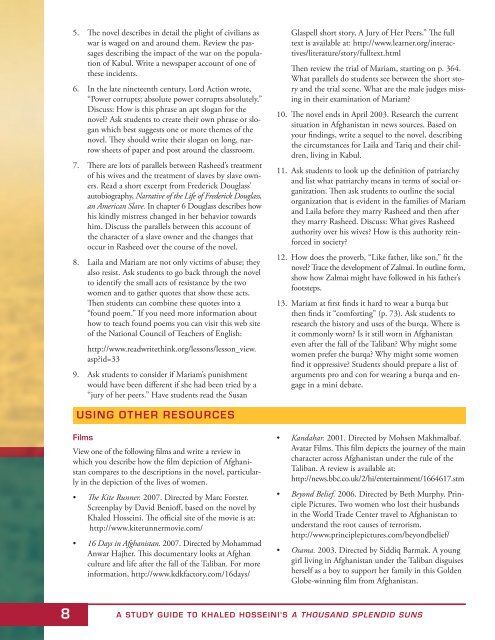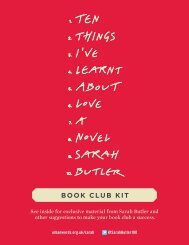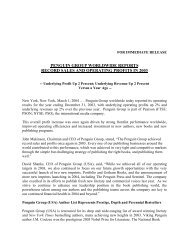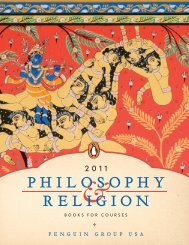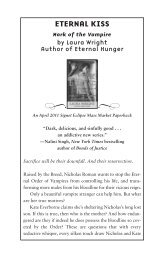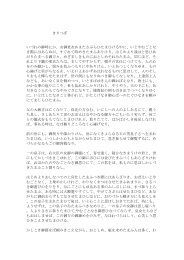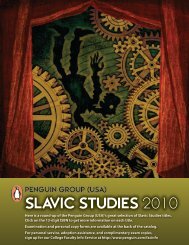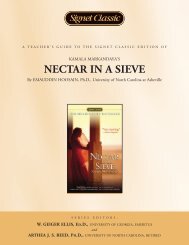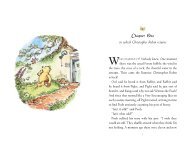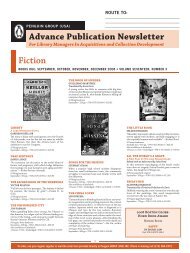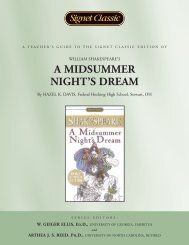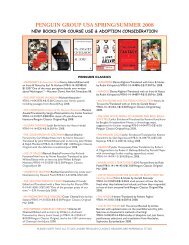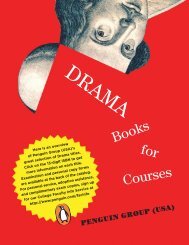KHALED HOSSEINI - Penguin Group
KHALED HOSSEINI - Penguin Group
KHALED HOSSEINI - Penguin Group
Create successful ePaper yourself
Turn your PDF publications into a flip-book with our unique Google optimized e-Paper software.
5. The novel describes in detail the plight of civilians as<br />
war is waged on and around them. Review the passages<br />
describing the impact of the war on the population<br />
of Kabul. Write a newspaper account of one of<br />
these incidents.<br />
6. In the late nineteenth century, Lord Action wrote,<br />
“Power corrupts; absolute power corrupts absolutely.”<br />
Discuss: How is this phrase an apt slogan for the<br />
novel? Ask students to create their own phrase or slogan<br />
which best suggests one or more themes of the<br />
novel. They should write their slogan on long, narrow<br />
sheets of paper and post around the classroom.<br />
7. There are lots of parallels between Rasheed’s treatment<br />
of his wives and the treatment of slaves by slave owners.<br />
Read a short excerpt from Frederick Douglass’<br />
autobiography, Narrative of the Life of Frederick Douglass,<br />
an American Slave. In chapter 6 Douglass describes how<br />
his kindly mistress changed in her behavior towards<br />
him. Discuss the parallels between this account of<br />
the character of a slave owner and the changes that<br />
occur in Rasheed over the course of the novel.<br />
8. Laila and Mariam are not only victims of abuse; they<br />
also resist. Ask students to go back through the novel<br />
to identify the small acts of resistance by the two<br />
women and to gather quotes that show these acts.<br />
Then students can combine these quotes into a<br />
“found poem.” If you need more information about<br />
how to teach found poems you can visit this web site<br />
of the National Council of Teachers of English:<br />
http://www.readwritethink.org/lessons/lesson_view.<br />
asp?id=33<br />
9. Ask students to consider if Mariam’s punishment<br />
would have been different if she had been tried by a<br />
“jury of her peers.” Have students read the Susan<br />
USING OTHER RESOURCES<br />
Films<br />
View one of the following films and write a review in<br />
which you describe how the film depiction of Afghanistan<br />
compares to the descriptions in the novel, particularly<br />
in the depiction of the lives of women.<br />
• The Kite Runner. 2007. Directed by Marc Forster.<br />
Screenplay by David Benioff, based on the novel by<br />
Khaled Hosseini. The official site of the movie is at:<br />
http://www.kiterunnermovie.com/<br />
• 16 Days in Afghanistan. 2007. Directed by Mohammad<br />
Anwar Hajher. This documentary looks at Afghan<br />
culture and life after the fall of the Taliban. For more<br />
information, http://www.kdkfactory.com/16days/<br />
Glaspell short story, A Jury of Her Peers.” The full<br />
text is available at: http://www.learner.org/interactives/literature/story/fulltext.html<br />
Then review the trial of Mariam, starting on p. 364.<br />
What parallels do students see between the short story<br />
and the trial scene. What are the male judges missing<br />
in their examination of Mariam?<br />
10. The novel ends in April 2003. Research the current<br />
situation in Afghanistan in news sources. Based on<br />
your findings, write a sequel to the novel, describing<br />
the circumstances for Laila and Tariq and their children,<br />
living in Kabul.<br />
11. Ask students to look up the definition of patriarchy<br />
and list what patriarchy means in terms of social organization.<br />
Then ask students to outline the social<br />
organization that is evident in the families of Mariam<br />
and Laila before they marry Rasheed and then after<br />
they marry Rasheed. Discuss: What gives Rasheed<br />
authority over his wives? How is this authority reinforced<br />
in society?<br />
12. How does the proverb, “Like father, like son,” fit the<br />
novel? Trace the development of Zalmai. In outline form,<br />
show how Zalmai might have followed in his father’s<br />
footsteps.<br />
13. Mariam at first finds it hard to wear a burqa but<br />
then finds it “comforting” (p. 73). Ask students to<br />
research the history and uses of the burqa. Where is<br />
it commonly worn? Is it still worn in Afghanistan<br />
even after the fall of the Taliban? Why might some<br />
women prefer the burqa? Why might some women<br />
find it oppressive? Students should prepare a list of<br />
arguments pro and con for wearing a burqa and engage<br />
in a mini debate.<br />
• Kandahar. 2001. Directed by Mohsen Makhmalbaf.<br />
Avatar Films. This film depicts the journey of the main<br />
character across Afghanistan under the rule of the<br />
Taliban. A review is available at:<br />
http://news.bbc.co.uk/2/hi/entertainment/1664617.stm<br />
• Beyond Belief. 2006. Directed by Beth Murphy. Principle<br />
Pictures. Two women who lost their husbands<br />
in the World Trade Center travel to Afghanistan to<br />
understand the root causes of terrorism.<br />
http://www.principlepictures.com/beyondbelief/<br />
• Osama. 2003. Directed by Siddiq Barmak. A young<br />
girl living in Afghanistan under the Taliban disguises<br />
herself as a boy to support her family in this Golden<br />
Globe-winning film from Afghanistan.<br />
8 A STUDY GUIDE TO <strong>KHALED</strong> <strong>HOSSEINI</strong>’S A THOUSAND SPLENDID SUNS


